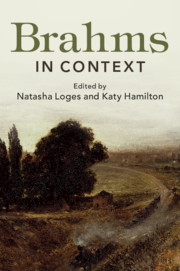Book contents
- Brahms in Context
- Brahms in Context
- Copyright page
- Dedication
- Contents
- Illustrations
- Music Examples
- Notes on Contributors
- Preface
- Abbreviations
- Part I Personality, People and Places
- Part II Identities, Environments and Influences
- Part III Performance and Publishing
- Part IV Society and Culture
- Part V Reception and Legacy
- Chapter 31 Germany
- Chapter 32 England
- Chapter 33 Analysis
- Chapter 34 The Era of National Socialism
- Chapter 35 Editing Brahms
- Chapter 36 Recordings
- Chapter 37 Historical Performance
- Chapter 38 Inspiration
- Chapter 39 Mythmaking
- Further Reading
- Index
- References
Chapter 39 - Mythmaking
from Part V - Reception and Legacy
Published online by Cambridge University Press: 15 May 2019
- Brahms in Context
- Brahms in Context
- Copyright page
- Dedication
- Contents
- Illustrations
- Music Examples
- Notes on Contributors
- Preface
- Abbreviations
- Part I Personality, People and Places
- Part II Identities, Environments and Influences
- Part III Performance and Publishing
- Part IV Society and Culture
- Part V Reception and Legacy
- Chapter 31 Germany
- Chapter 32 England
- Chapter 33 Analysis
- Chapter 34 The Era of National Socialism
- Chapter 35 Editing Brahms
- Chapter 36 Recordings
- Chapter 37 Historical Performance
- Chapter 38 Inspiration
- Chapter 39 Mythmaking
- Further Reading
- Index
- References
Summary
During his lifetime, Brahms witnessed a veritable explosion in biographical writing and related publications of letters, memoirs and diaries. The monumental Allgemeine deutsche Biographie (1875–1912) was edited by Rochus von Liliencron (1820–1912), a personal acquaintance of his; a comparable project in Great Britain was the Dictionary of National Biography (1885–1900). Significant biographies of famous Austro-German composers also appeared in those years, often written by Brahms’s friends: Otto Jahn’s Mozart (1856–9), Friedrich Chrysander’s Handel (1858–67), Philipp Spitta’s Bach (1873–80) and Carl Ferdinand Pohl’s Haydn (1875–82). But one might also think of the biography of Beethoven (1866–79) by the American Alexander Wheelock Thayer, a project which was taken up in German by Hermann Deiters, Jahn’s pupil and Brahms’s colleague and contemporary. It was Deiters who in 1880 wrote the first book-length biography of Brahms, when the composer still had seventeen years to live.
- Type
- Chapter
- Information
- Brahms in Context , pp. 384 - 392Publisher: Cambridge University PressPrint publication year: 2019

